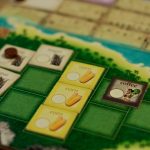The ongoing pandemic poses many challenges to our mental health and wellbeing. Can aesthetics help us out? Continue reading

May 10, 2021
by Aesthetics for Birds
1 Comment


May 10, 2021
by Aesthetics for Birds
1 Comment
The ongoing pandemic poses many challenges to our mental health and wellbeing. Can aesthetics help us out? Continue reading

March 11, 2021
by Aesthetics for Birds
0 comments
The full recording of our recent workshop Continue reading

February 12, 2021
by Aesthetics for Birds
1 Comment
The context of gameplay, the enchanting interactive and immersive effects, plays a role in limiting rationality and enabling exploitation. Continue reading
August 3, 2020
by C. Thi Nguyen
15 Comments
Role-playing games have a lot to teach us about the importance of community and playfulness in the classroom. Continue reading
December 6, 2019
by Aesthetics for Birds
4 Comments
This year marks the end of the second decade of the 2000s. In honor of this, we thought we’d take a look back at our decade with an end-of-year series. The internet loves lists, especially year-end ones, and we’ll feed that love a little bit this December. We’ll be hosting seven lists of expert Decade-Best picks. We’ve done movies, and you can look forward to writing, television, music, traditional visual arts, and one surprise list at the end. Each will include philosophers working in these and related areas, but also other academics whose work concerns these topics and people working in the relevant media. But up today: games! We asked our experts to rank their top five games of all kinds, so let’s see what the 2010s gave us to play with. Our contributors are: Christopher Bartel, professor in Philosophy at Appalachian State University Thi Nguyen, associate professor in Philosophy … Continue reading

August 21, 2019
by Aesthetics for Birds
1 Comment
In a recent New York Times article, journalist Kevin Draper brings us up to date on some recent controversies in the world of historical board games. The article centers on the cancellation of Scramble for Africa, a historical board game which was to let players take the role of European powers exploring and exploiting Africa, trying to get the most resources. Joe Chacon, the designer of Scramble for Africa, was accused of not treating this situation with appropriate seriousness. In his game, the savagery that was part and parcel of that exploration seems to be dealt with in minor and trivializing ways. The players must put down rebellions, and can slow their opponents by inciting native revolts. Random events include “penalties for atrocities” and rewards for ending slavery. Butchery is gameified. The article raises a number of fascinating questions. What are the ethics of gaming history? Can we ever gameify our troubled past, and … Continue reading
March 6, 2019
by Aesthetics for Birds
7 Comments
What follows is a post in our JAAC x AFB collaborative series, where we highlight articles from the Journal of Aesthetics and Art Criticism. This post features Marissa D. Willis’ recent paper, “Choose Your Own Adventure: Examining the Fictional Content of Video Games as Interactive Fictions“. “Video games don’t tell stories,” he told me. “They’re just games.” So said a friend of mine when I told him I was writing about video games as works of fiction. And despite his mansplaining my own topic to me, my friend was giving voice to the very problem which I hope to address. Despite the fact that more people are playing video games these days than ever before, and game makers continue to create more inventive and engaging narrative works every day, my friend is not alone in his opinion.

July 3, 2018
by Aesthetics for Birds
2 Comments
What follows is a guest post by Laura T. Di Summa (William Paterson University). Perhaps we can agree on the fact that philosophers have not, for the most part, taken fashion very seriously. There seems to be something wrong, specifically, about being fashionable – about trafficking in the world of glossy magazines, runways, and looks and styles that change, frequently, and at a price. There seems to be something wrong about wearing the very clothes we find in those magazines, about buying them, and about investing energy (and money) in keeping up with them.
March 2, 2017
by Aesthetics for Birds
5 Comments
Welcome to the third AFB x JAAC Discussion! Today, we will be looking at “What’s My Motivation? Video Games and Interpretive Performance” by Grant Tavinor, available in the Winter 2017 volume, 75 (1) of the Journal of Aesthetics and Art Criticism (JAAC), online here. Grant is Senior Lecturer of Philosophy at Lincoln University, NZ and author of the book The Art of Videogames. And big thanks to C. Thi Nguyen (Utah Valley University) for providing the critical précis. Grant’s response follows that, and they will both be available to discuss your questions and thoughts in the comments! Check it all out below the fold.
May 17, 2016
by Aesthetics for Birds
0 comments
This is entry #50 in our 100 Philosophers, 100 Artworks, 100 Words Series.